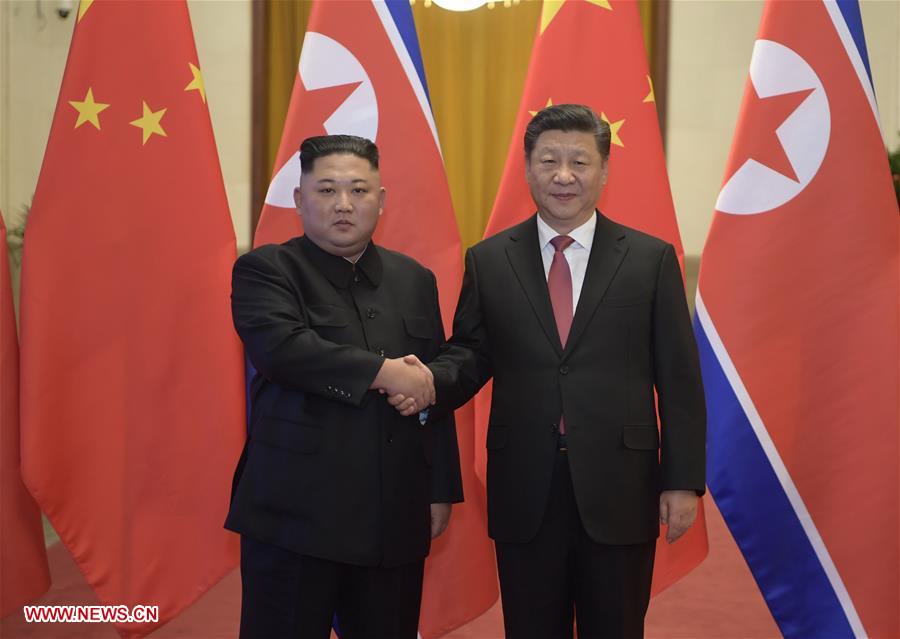DPRK visit an opportunity to integrate Northeast Asia
By Zou Zhibo | China Daily Global | Updated: 2019-06-19 08:59

President Xi Jinping's two-day visit to the Democratic People's Republic of Korea, which starts on Thursday, will take China-DPRK relations to a new level.
Xi, who is also general secretary of the Central Committee of the Communist Party of China, will visit the DPRK at the invitation of Kim Jong-un, chairman of the Workers' Party of Korea and chairman of the State Affairs Commission of the DPRK.
This year marks the 70th anniversary of the establishment of diplomatic ties between the People's Republic of China and the DPRK.
Although the two neighbors have always shared close relations, the traditional friendship between the two countries has been renewed and promoted since Kim's four visits to China, the first of which was in March last year. Currently, the denuclearization of the Korean Peninsula is entering a crucial phase.
Against this backdrop, President Xi's visit will have a far-reaching influence on the bilateral relations and the evolving situation in the region.
Although the bilateral relations have experienced fluctuations, the DPRK made a major transition in national policy last year, shifting its focus to economic construction, freezing nuclear tests and working on improving external relations.
During Kim's four visits to China, he and Xi have reached consensus on China-DPRK relations.
In this context, Xi's upcoming visit will see the relationship enter a new era.
First, in a world undergoing major changes, the visit will signal a strategic direction that will lay out a solid foundation for a steady, long-term relationship between the two countries.
Second, the visit will help achieve concrete and pragmatic results in political, diplomatic, economic, trade and cultural cooperation, and push for in-depth and pragmatic development of bilateral ties.
Third, both countries-as socialist countries-are exploring the development path suitable for their own national conditions. The visit will promote mutual learning and common development, creating a new model of socialist countries engaging in win-win cooperation in the new era.
The visit will also give fresh impetus to denuclearization of the Korean Peninsula, which is at a crossroads.
On a positive note, the DPRK made a huge national policy transition and froze its nuclear tests, showing resolve for denuclearization. The United States and the DPRK have seen their relations improve and have held two summits.
There are also serious differences between the US and the DPRK on the mode of denuclearization, leading all efforts into a stalemate, with each country blaming the other.
At this crucial stage, China, as a staunch promoter of denuclearization, could play an important part in the process, given its long-term cooperation with the US on the issue and its sustained friendship with the DPRK.
China gives its full support to the DPRK in both its economic construction and denuclearization efforts. At the same time, it fully backs the DPRK in addressing its security concerns.
The visit will also make new advances in the development of Northeast Asia.
The world is witnessing profound changes, with the economic center of gravity shifting from Europe and North America to Northeast Asia, with China, Japan and the Republic of Korea at its core. Eastern civilization is embracing revitalization, and Northeast Asia is seeing brighter prospects.
What Northeastern Asian countries need to do is discard the mentality of isolation and confrontation and embrace reconciliation and cooperation to build an integrated Northeast Asia-a community with integrated economic, trade, social, cultural, political and security interests. At the same time, uncertainties still exist, in particular in the DPRK's relations with other countries, which will affect the building of such a community with a shared future.
Since China maintains amicable relations with Japan, the ROK and the DPRK, it will promote the DPRK's relations with various sides and push the situation in Northeast Asia toward greater development.
China is fully capable of leveraging its political, economic and cultural strengths to promote and lead the integration of Northeast Asia. President Xi's upcoming visit represents an important opportunity to include the DPRK in the broader picture of Northeast Asia's development, especially in promoting the integration of Northeast Asia through the Belt and Road Initiative.
The author is deputy director of the Institute of World Economics and Politics of the Chinese Academy of Social Sciences. The views do not necessarily reflect those of China Daily.
























